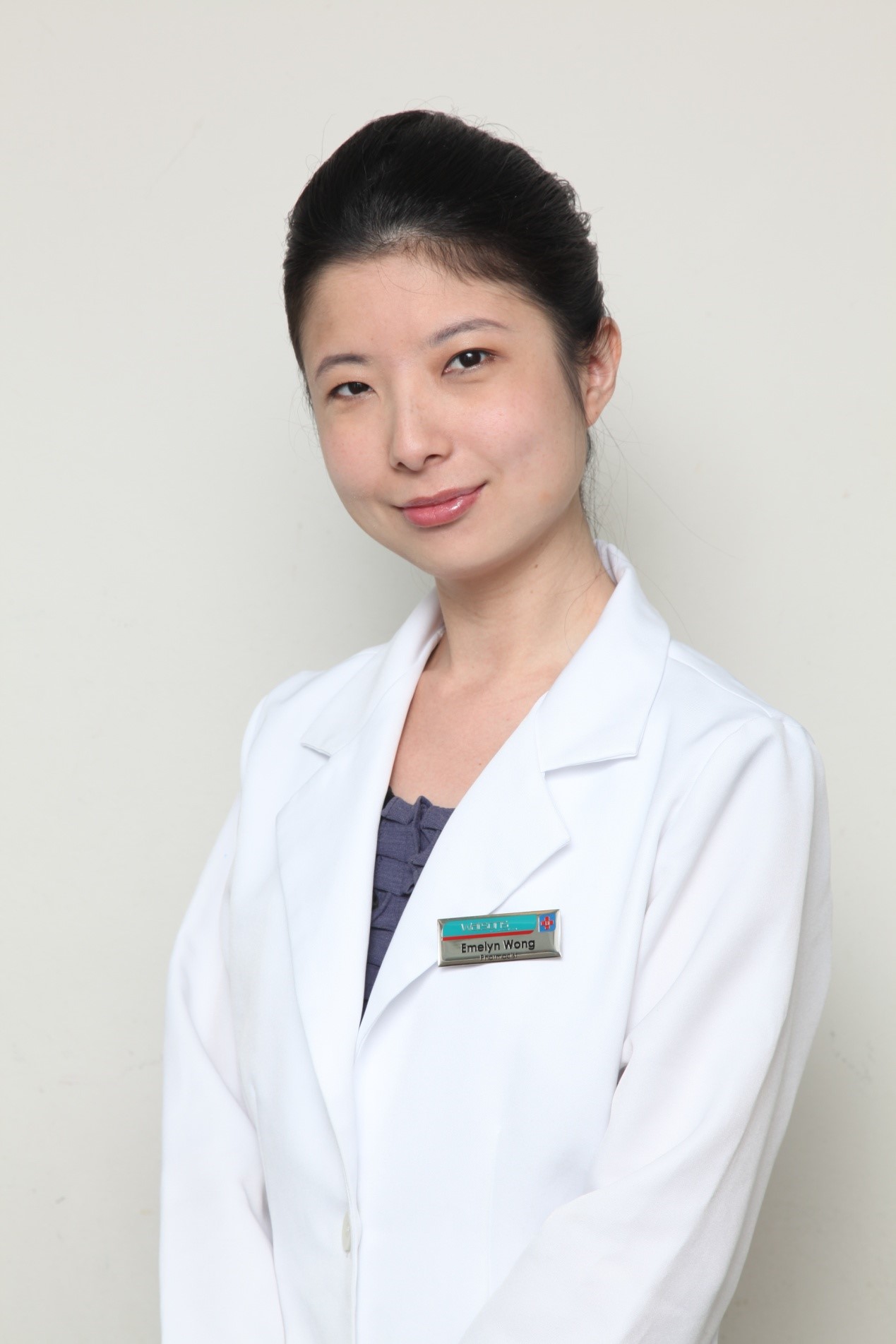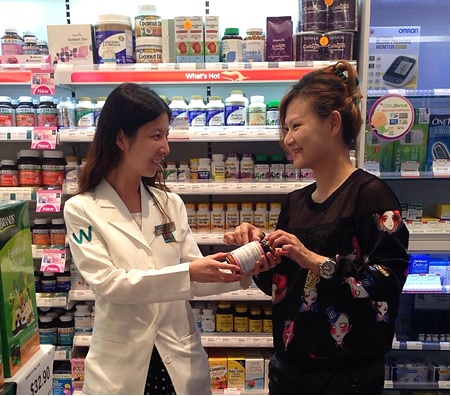You are here
PSS Shining Star is a PSS initiative to showcase role models in community pharmacies. This month's Shining Star is Ms Emelyn Wong Yoke Fun from Watsons.
PSS Shining Star Interview
Watsons – Ms Emelyn Wong Yoke Fun
Ms Emelyn Wong Yoke Fun was nominated as a Shining Star, as part of the PSS initiative that features individuals who embody the exceptional qualities of a community pharmacist.

1. Why did you choose pharmacy as your profession?
Since my secondary school days, I had developed a keen interest in Biology. To work in the related fields of medical sciences after graduation has always been my ambition.
Pharmacy practice provides me with a good channel to create a direct positive impact on the health of the community, as well as the versatility to work in various settings such as hospital, polyclinic, retail pharmacy and pharmaceutical industry.
2. Why did you choose to be a community pharmacist?
As a community pharmacist, I get to spend more time with my customers or patients to discuss about health issues as well as educate them on the appropriate use of medicines. The increase in interaction time has helped me build a strong rapport with some of my customers who regularly return for healthcare advice and to update me about their health conditions. This is the most satisfying part of my profession as a community pharmacist. In addition, preventive health care usually starts at the community level. Hence, many opportunities abound for me as a community pharmacist to talk to customers on empowering them to take charge of their health to prevent common chronic ailments such as hypertension and diabetes.
3. What helped/ motivated you to be where you are today?
During my 2 years’ involvement as a student volunteer in Interact Club during Junior College, I realised that much more could be done to help the less fortunate in Singapore, some of whom I visited were very sickly or bed-ridden. From there on, I aspired to become a pharmacist with the aim to improve the health of the residents in Singapore.
Most importantly, the constant support, guidance and encouragement from my colleagues and superiors have been my main pillar of strength. Without them, I would not be where I am today. I am very thankful for all that they have given me.
4. Who would you say is your role model, who inspired you to excel in the pharmacy field that you choose?
Although I do not have any specific role model whom I look up to, many people have been my sources of inspiration. In school, I had great teachers who constantly motivated me to do my best in everything and instilled in me important values such as caring for the society. Till this day, their teachings have served me well as a pharmacist. At work, the dedication and passion of my colleagues to bring pharmacy practice to the next level impressed and inspired me tremendously to do even better each time.
5. What is your advice for your fellow pharmacists and for people who are considering this career?
Pharmacy practice has evolved significantly over the years and the roles of a pharmacist are no longer confined to behind-the-counter dispensing. Pharmacy is a special calling that requires professional knowledge, passion and empathy in helping patients achieve their healthcare goals. For those who aspire to improve the lives of people through providing pharmaceutical services, a career in pharmacy will prove to be a fulfilling and rewarding one.
6. Given that Singapore will be experiencing one in three citizens aged 65 and above by 2030, how do you think pharmacists can contribute to the healthcare of this group of people?
With the fast ageing population, it presents a good opportunity for pharmacists on take on expanded roles in the following major aspects:
a) Preventive healthcare by providing health advice and information to seniors on prevention of chronic ailments
b) Polypharmacy management. The elderly is usually afflicted by multiple medical problems which often require 5 or more drugs for treatment. Pharmacists play important roles in helping to detect drug-related problems arising from polypharmacy and optimising drug therapy to improve patient health outcomes and reduce cost.
c) Patient education on the correct use of drugs including over-the-counter medicines and providing them with resources on health or drug-related information which they can readily access.
7. What is the most memorable moment in your pharmacy career?
It will be the times when customers or patients return to thank me personally for my advice, that my recommendations worked for them and they are on their road to recovery. I still vividly remember a patient who took the extra mile to bake me Chinese New Year cookies for 2 years and I am deeply heartened by such a unique expression of gratitude by this particular patient.
8. Describe your career progression path.
After graduating from NUS pharmacy school, I started my pre-registration pharmacist training at National University Hospital for 9 months. After having successfully completed my training, I became a licensed pharmacist and continued working in the hospital’s retail outpatient pharmacy.
After some years, I decided to make a switch to community pharmacy and have been working at Watsons Vivocity as the resident pharmacist. I was subsequently promoted to the position of Senior Pharmacist.
As the in-charge of health article and patient information leaflet (PIL) writing under pharmacy awareness portfolio, my main role is to oversee the portfolio and vet articles written by team members, to ensure accuracy before publishing. In this portfolio, we also explore new ways to engage and educate the public on health and pharmacy-related topics.
Besides article and PIL writing, I am involved in the pre-registration pharmacist training portfolio. Each year, a pre-registration pharmacist will be assigned under my care.
9. Can you describe a typical day at work?
My day starts at 10.30am with the opening of the dispensary. Most part of the day is spent talking to customers who are looking for OTC/pharmacy medicines to treat minor ailments, recommending blood pressure machines and glucose meters, filling up prescriptions, as well as providing advice to customers who require information on their health. In between, I will check my work emails as there may be important messages that require prompt action on my part as the portfolio in-charge of health article writing. Besides the daily general dispensary operations such as stock ordering/receiving, expiry monitoring and following-up with customer requests, I am also involved in the pre-registration pharmacist training as a main preceptor and I would spend some time with my pre-registration pharmacist to discuss about pharmacy and work-related matters. The dispensary closes at 9.30pm which usually marks the end of my day.

10. What do you think are the important skills that a pharmacist needs to be equipped?
A pharmacist needs to possess both hard and soft skills in order to be successful. Besides drug knowledge which is an essential hard skill for every pharmacist, soft skills such as effective communication, problem solving and attention to details are equally important.
11. What is your wish list to your patients/ the public who comes to you?
It is my hope that patients or customers learn to be more proactive in taking charge of their own health and consult the pharmacist whenever they are in doubt.
Customer Compliment for Ms Emelyn Wong:
“A customer with a bleeding toe came into the pharmacy. The wound looked grisly with blood all over his foot but Emelyn was not deterred by it. She gently helped the customer cleanse the wound while advising him on what to do next. This is clearly an extra mile above and beyond her duty. Emelyn’s action really impressed upon me her outstanding service level. Kudos!” – Mr Tony Woon


